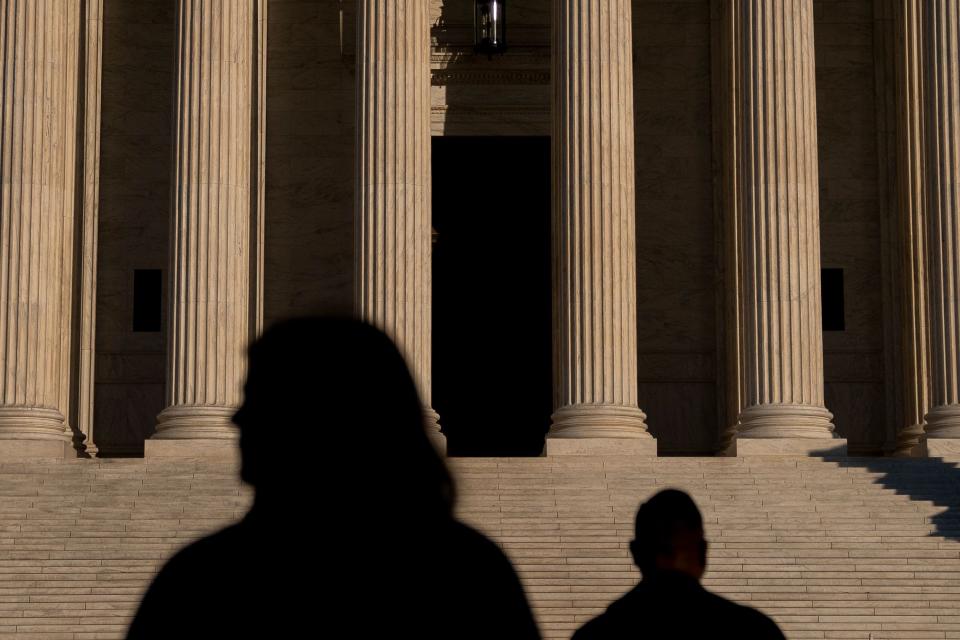As gun owners, we urge the Supreme Court to uphold restrictions on domestic abusers
As the nation reels in the aftermath of yet another mass shooting – this time in Lewiston, Maine – many Americans, both gun owners and non-gun owners, are asking themselves how we keep guns out of the hands of dangerous people. Against this backdrop, the Supreme Court is scheduled to hear oral arguments in a case that will decide the fate of modern gun laws designed to do just that.
Though Lewiston shooter Robert Card and Zackey Rahimi – the defendant in the case on the Supreme Court docket Tuesday – share little in common in terms of background or criminal history, what unites them is the question of when an American should be denied access to a firearm.
In Card’s case, he was experiencing a mental health decline that alarmed his family and colleagues.
Rahimi was accused of domestic violence and the subject of a restraining order after multiple, documented violent incidents involving firearms.

Why we submitted an amicus brief in U.S. v. Rahimi
At the heart of U.S. v. Rahimi is a decades-old federal law that prohibits the possession of a gun by those subject to a domestic violence protection order. The 5th Circuit Court of Appeals struck down the law over concerns about due process and because it failed to recognize historical equivalents.
Some context: In a June 2022 decision, New York State Rifle & Pistol Association, Inc. v. Bruen, the justices established a new test that determines what’s constitutional based on whether there was a similar law at the time of America’s founding.
As a former NRA lobbyist and a career national security official, we cheered the Bruen decision, which ruled unconstitutional a New York law mandating concealed carry applicants demonstrate "proper cause" to obtain a permit. Law enforcement should not be able to deny someone a permit based on subjective guidelines. But the philosophy behind the decision has significant implications that pose a threat to every gun law on the books.
Now, our nation’s highest court will decide just how literal the justices intended their Bruen test to be.
Gun suspension is unconstitutional: New Mexico governor's gun suspension defies 2nd Amendment. And it doesn't make us any safer.
As leaders of the gun safety organization 97Percent, we are working to reduce gun-related deaths by including gun owners in the solutions. Our research has found that 76.9% of gun owners support prohibiting gun possession by people subject to a domestic violence restraining order.
That’s why we submitted an amicus brief imploring the Supreme Court to reverse the Rahimi decision.
Disarm domestic abusers who pose a credible, proven threat
The goal of 97Percent’s brief is not to discuss how a victim or survivor of violence is five times more likely to die when an abusive partner has access to a gun. We do not talk about Rahimi’s well-documented background of violence, as a suspect in five shootings. While these are certainly valid arguments, our focus is on due process and historical precedent – as they are the markers by which the Supreme Court will make its decision.
Before a restraining order is issued, the court is required to give the accused a chance to defend themselves. Following that hearing, they are stripped of their right to possess a gun only if the court rules that they pose a threat. The loss of rights is temporary, until the order expires, and the order can be dissolved if new evidence becomes available.
I'm a sexual assault survivor. Now I train women to use guns to protect themselves.
These orders are issued for proven acts or threats of violence. The greatest predictor of future violence is past violence. And our 97Percent research has found that the most deeply held principle among gun owners regarding gun laws is that people at high risk of violence should not be able to own a gun.
Those who oppose the law have said that they believe only convicted criminals should be disarmed. Our brief shows how a criminal conviction is not required for the loss of other constitutionally protected liberties – such as when citizens are placed on the no-fly list and cannot travel by plane.
Opinion alerts: Get columns from your favorite columnists + expert analysis on top issues, delivered straight to your device through the USA TODAY app. Don't have the app? Download it for free from your app store.
Not to mention that criminal proceedings often take months or years, leaving victims unprotected at the very moment when they are in the most danger: 77% of domestic violence-related homicides occur at the time victims leave their abusers.
Though a restraining order is the product of modern laws that recognize women’s political rights and the threat of domestic violence in a way that did not exist in the founding era, our brief cites numerous examples of how the Founders prevented groups of people they deemed dangerous from possessing guns.

We are two gun owners who’ve long championed the Second Amendment and are skeptical of restrictions, but domestic abusers who pose a credible, proven threat must be disarmed.
Restraining orders provide strong due process protections, and they’re consistent with founding-era restrictions. Like policies such as universal background checks, they’re forward-looking solutions to modern-day problems that also protect the Second Amendment.

We call on the Supreme Court to reverse the Rahimi decision. Failure to do so will have far-reaching implications, including in cases like that of the Lewiston shooter.
Lives are hanging in the balance, and the Supreme Court's backward-looking test is threatening the chance to save them.
Olivia Troye, executive editor of 97Percent, formerly served as a senior adviser to Vice President Mike Pence and in a number of senior national security roles. Abra Belke, an attorney and a 97Percent board member, formerly served as an NRA lobbyist and has provided pro bono counsel to domestic violence victims.
You can read diverse opinions from our Board of Contributors and other writers on the Opinion front page, on Twitter @usatodayopinion and in our daily Opinion newsletter. To respond to a column, submit a comment to letters@usatoday.com.
This article originally appeared on USA TODAY: With gun case, Supreme Court must defend domestic violence victims

